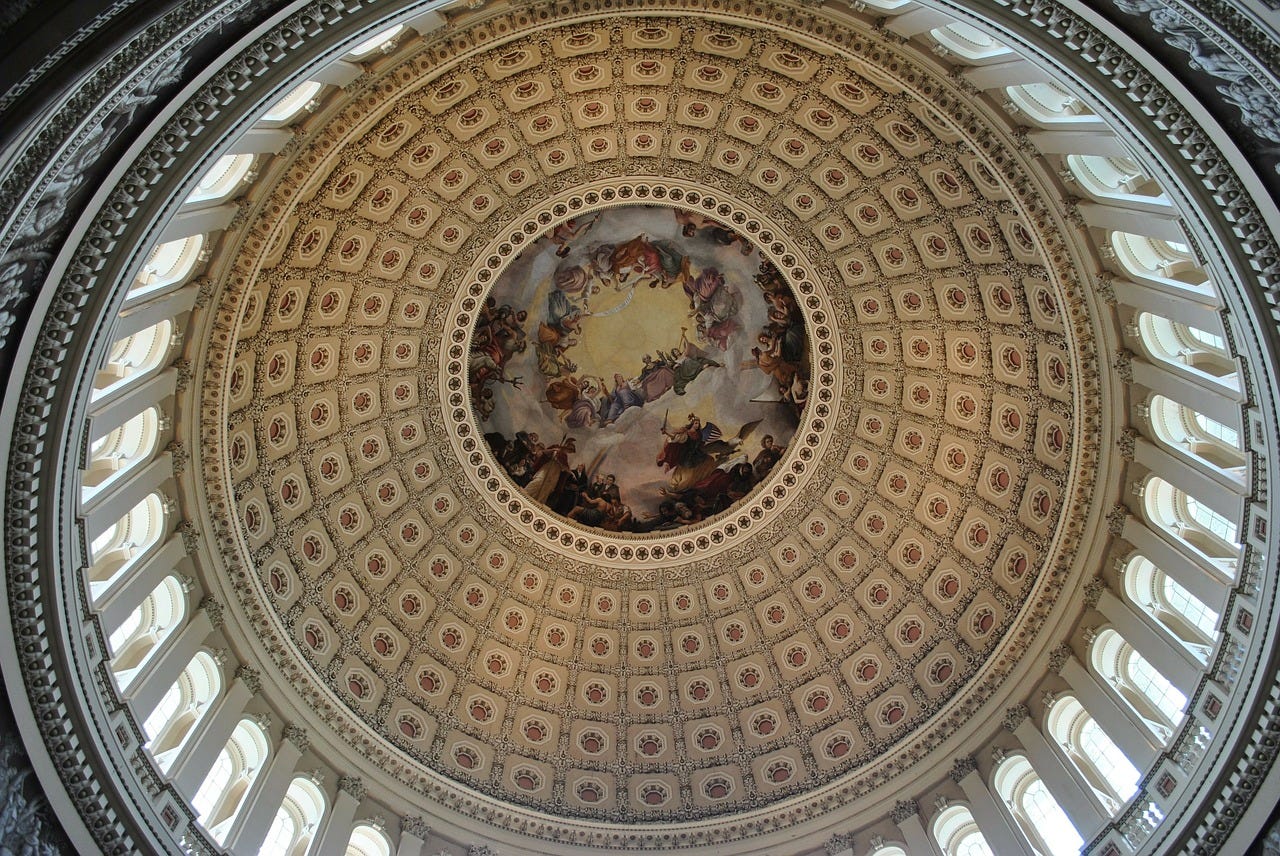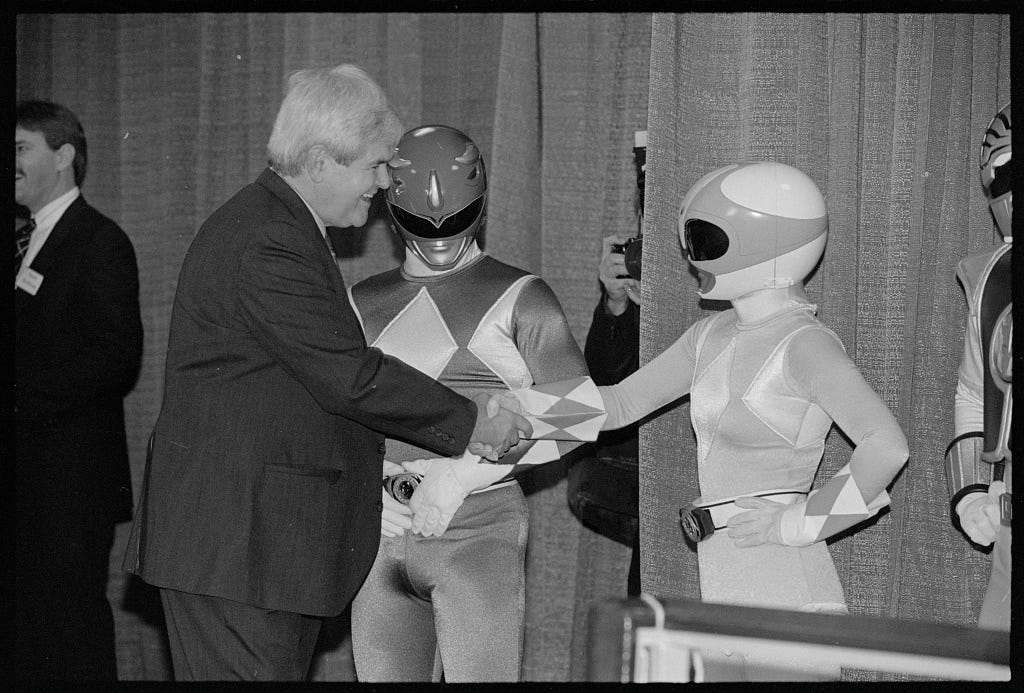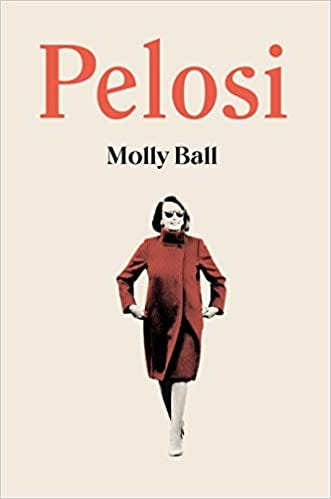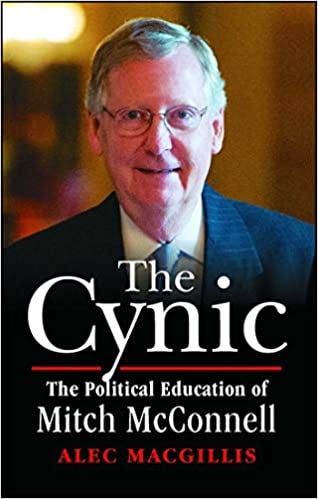Congressional Greatness
What could make Congress great again? And why the answer matters
About Systematic Organization
I’m Paul Musgrave, a political scientist and writer. This is Systematic Organization, my newsletter about my thoughts regarding politics and the study of politics. The newsletter takes its title from a line in The Education of Henry Adams:
Politics, as a practice, whatever its professions, had always been the systematic organization of hatreds, and Massachusetts politics had been as harsh as the climate. The chief charm of New England was harshness of contrasts and extremes of sensibility—a cold that froze the blood, and a heat that boiled it—so that the pleasure of hating—one's self if no better victim offered—was not its rarest amusement; but the charm was a true and natural child of the soil, not a cultivated weed of the ancients.Everyone agrees that presidential leadership matters.
This week, we’re talking about what makes a politician great and what leadership in Congress looks like.
Congressional Greatness: An Enigma
Presidential greatness porn is one of the rare genres of “serious” nonfiction books that sell, especially around Father’s Day. Doris Kearns Goodwin got famous writing about it, back when she was finishing her White House Fellowship, and then later she got rich writing about Lincoln. I imagine that H.W. Brands has rooms named for the presidents whose biographies paid for their renovations—the Roosevelt Kitchen, the Eisenhower Study, the LBJ Library.
There’s many problems with a fixation on presidents. One is that most presidents suck. Once you get past the tenth or twelfth position on the “presidential greatness” rankings, you’re dealing with some pretty mediocre folks. If you’re even the slightest bit woke, you recognize that all presidents are problematic faves, even the canonical good ones like Lincoln and FDR. Having a pantheon of leadership greats is even worse when all the leaders are male and all but one is White.
But the fundamental problem with all of this president talk is that it poisons our understanding of democracy because it casts all of Congress into a shadow. Having just come from a year as a fellow on Capitol Hill as part of the American Political Science Association’s Congressional Fellowship Program, I’m engaging in a lot of recency bias here, but it really was astonishing to be on the Hill (or, later, pandemic-telecommuting to the Hill) and to see how little legislative leadership resembled popular notions of greatness.
Let’s acknowledge that “greatness” talk is mostly a parlor game. But I think it’s a game that eventually everyone but the most committed Marxists play. It may be a myth, but that doesn’t make investigating the myth-making any less important. Having our standards of what political greatness looks like set by the executive systematically devalues legislative leadership. And that matters because expecting Congress to behave like the president is expecting a democracy to behave like a monarchy.
Even if presidential greatness is hard to define, we pretty much know it when we see it. A firm hand on the rudder, convictions chiseled into granite, a wily political mind providing tactical flexibility, and ideally a good sense of humor—presidential greatness is all about being the good king. Even more than their policies, that’s why JFK, whose accomplishments were marginal, keeps making the lists, and why McKinley, whose accomplishments were shockingly vast, never will. (It’s also probably the real reason why Jackson and Wilson, both problematic enough in other regards, never got to the top of the presidential lists, even though their terms in office were more substantively consequential than Washington’s.)
But congressional leadership? There’s no popular image, except maybe the reactionary fantasy of Mr. Smith Goes to Washington, in which a naif is appointed to the Senate and finds out about all the bad goings-on that take place in Washington. The idea that an unelected officeholder using the patently antidemocratic filibuster to hold up a New Deal project is the apotheosis of “good government” is absurd. But I assure you the easiest way to find out how many people love this movie is to criticize it in public.
Mentioning apotheoses, by the way, reminds me of the great irony of the Capitol. The central artwork in the building—the painting under the dome itself—is entitled The Apotheosis of Washington. Even in Congress’s majestic pile itself, the legislature couldn’t celebrate itself: its defining piece of artwork commemorates a president, not a legislator. In the same way, the most dominant work of legislative politics for those of us who aren’t specialists in Congress is Robert Caro’s series on Lyndon Johnson—a set of books written only because LBJ eventually became president. And even those legislators set on adding “the great” to their names normally assume they will do so by ascending to the presidency. Legislative greatness has no natural constituency.

Brumidi’s The Apotheosis of Washington.
The central activities of Congress rarely lend themselves to dramatic portrayals. In the nineteenth century, when Congress was distinctly the dominant branch of government, the monumental accomplishments of the branch were tariffs and compromises. There are no triumphal arches dedicated to either. (Although the idea of a monument dedicated to the Tariff of Abominations is probably Kickstarter-worthy.)
Who ever wanted to celebrate a compromise? For the average person, compromises aren’t accomplishments but appeasements—substitutes for victory.
And yet of the three core tasks of Congress—lawmaking, appropriating, and oversight—two of them are defined entirely by compromise. The combination of institutional division and lack of party discipline compared with parliamentary democracies) means that this is inescapable.
The historically-noted may cavil that in the 19th century compromises were lauded precisely for their ability to compromise—Henry Clay became known as “The Great Compromiser” for his skill in putting together complex bargains—but that only proves my point: yes, this is how congressional greatness used to be defined. But it isn’t anymore. Indeed, even though everyone says they want compromise, political scientists suggests people really don’t.
The other way to become a great lawmaker, of course, would be to actually make laws. But most major legislation that advances from the chamber now is associated with a president or, like the CARES Act, is driven by a multiplicity of authors, mostly on committee staffs. Such legislative victories may have a thousand fathers, but that tends to reduce any single legislator’s ability to claim credits toward greatness.
So if lawmaking and compromise is out as a path to greatness, how can one see congressional greatness at work? One answer might be oversight, probably best known in the guise of congressional hearings. Movies and television do recognize implicitly the importance of oversight functions. The congressional hearing is such a familiar setting, from The Godfather to Patriot Games to Contact, that it hardly needs to be established at all. The hearing is a great work of theater, designed to produce made-for-TV moments since cameras first came into the committee rooms. It’s the only part of Congress at work that’s routinely shown on the news.
And so it may come as a surprise to folks to learn that most hearings are more or less pseudo-events in which pretty much everything is known ahead of time. Hearings really are theater in the sense that they are both scripted. That doesn’t make them less important or even less powerful, but it does mean that the shocking twists and drama that filmic representations invest them with bear even less resemblance to reality.
Real oversight work, like real legislation, takes place offstage, in persistent investigations and endless boring meetings. When he was just a political scientist, Woodrow Wilson observed that “Congress at work is Congress in committee.” But that is another way to say that watching Congress is inherently dull. Few committee meetings are freighted with the kind of drama that the presidency, or even the judiciary, can match. And although you can tell an exciting story about a committee meeting, a la Twelve Angry Men, it’s a lot harder than telling stories about a president making a decision.
If the essence of drama is conflict, legislative work has all of the elements of good drama in spades. (Charlie Wilson’s War also understood this, which makes me wish that screenwriter Aaron Sorkin had written about the Capitol instead of The West Wing.) In some ways, the problem is that there’s too much conflict along too many shifting dimensions. Whereas presidents get to tell an illusory coherent narratives about themselves, Congress cannot settle on one storyline among fixed protagonists.

Greatness: Speaker Newt Gingrich meets heroes. Library of Congress.
Yet this only highlights how the notion of presidential greatness is, mostly, illusory. It reflects less the personal qualities of any single president and more the constellation of interest groups and structural factors that allow a White House to find a path forward. The difference between ranking in the presidential top 10 and being in the ranks of the forgotten presidents comes down to whether a chief executive has the good fortune of having the country suffer a major misfortune, like a civil war or a world war. (Yes, the Trump administration has conclusively shown that presidential skill matters, so it’s not like the president himself is irrelevant, but one of the great skills a president develops is precisely in taking credit for other folks’ accomplishments—or for sheer coincidence.)
But here, I think, the greater obstacle placed before us by the presidential greatness discourse is its assumption that there is only one way of being great. Legislative greatness, to the extent it exists, is probably multidimensional. Some, like Czar Reed, manifest it in their control of rules. Others, like Barbara Jordan, excel as representatives—literally in their performance of representing a constituency bigger than themselves, or even their district. Still others, like Henry Waxman, achieve a degree of greatness through their mastery of oversight. (A final category, like John Lewis, arrive great.)
Taking legislative greatness seriously would open up a lot more stories like this. I’m not saying I know how to do this, since the whole point is that people seem to readily identify with the easily-narrated versions of political success that we can tell about presidents. But, that said, some changes are possible at the margins, like taking politicians more seriously as people and getting even deeper into the mysteries of the Hill to show how greatness—and vice—show up in the representative branch of government. That might, in turn, make democracy more appealing. And if AOC has figured out how to make Congress content go viral, I suspect that there are ways to make the institution more interesting and broaden our discourse about what greatness can be.
What I’m Reading
This week, I’m featuring two very different books about Congress.

The first is Molly Ball’s Pelosi, a biography of the first female House Speaker. This newsletter is more or less a reaction to Matthew Green’s laudatory review of the book in The Mischiefs of Faction.
I found the book interesting and humanizing for Pelosi. It’s far from perfect. It reads like an apologia rather than a deeply reported piece, even though it’s clear that Ball did put in a lot of shoeleather.
The book’s thesis is that Pelosi is, as she now apparently says, a “master legislator”, and Ball doesn’t quibble with that assessment—or even consider contrary evidence. There’s a number of objections that one can raise, like the fact that Pelosi does seem to tack toward a more cautious, 1980s version of what Democrats should believe in an awful lot. Similarly, if the brief for Pelosi is that she has a good handle on her caucus, then her seemingly frequent defeats in other leadership battles—most notably the fact that her rival, Steny Hoyer, keeps winning the number-two spot—seems to undercut that. And Pelosi’s liberalism, however sincerely felt, is not matched by an experience as a member of the working class: as the daughter of a Baltimore mayor and the wife of a wealthy financier (whose wealth receives scant attention in the book, even though it’s obviously relevant), Pelosi’s ascent was supercharged.
What was more useful was seeing Pelosi’s career laid out in full in the way that members of Congress rarely get the attention. And Ball clearly shows that if Pelosi is not great, then no member of leadership in the past several decades is. She clearly stands well above the other Speakers in my lifetime (a memory that stretches back, really, to Gingrich and thereafter). If her stands on principle often conflict with the imperatives of growing the caucus, then what can one say? And if her public appearances are maladroit (“Mr. Make Matters Worse”, “self-impeaching”), one nevertheless acknowledges that leading strategy for a caucus that often really is in disarray is tough. Approve or disapprove of her—Pelosi is the best of breed for ambitious legislators in our time.
The other book studies the other legislative titan of our day: Senate Majority Leader Mitch McConnell.

MacGillis’s book, written before the 2014 election, obviously misses a lot of what’s happened recently, but he captures McConnell’s rise and character enormously well. Not shackled by a mission to promote McConnell, MacGillis is free to do what Ball does not: write a book that includes scathing descriptions of his legislative and political strategy.
MacGillis’s title, The Cynic, encapsulates his judgment that McConnell is literally in it to win it—that his fixed motivation isn’t policy but rather political triumphs. He is the most diligent pupil of his campaign managers, working hard to learn how to overcome a deficit of charisma in order to win decisively in glad-handing Kentucky. He embraces civil rights when Republicans were liberal, and then rejects it when Reagan proves that conservatives can win. Zealous in protecting the rights of coal mine owners and campaign contributors, McConnell eventually fashions himself into the executive director of the rentier class, obstructing any threats he identifies to their wallets and well-being.
Is McConnell great? Well, yes and no. No, in the sense that he’s left almost no positive legacy. Yes, in the sense that he really is a titan of the Senate—he is the dominant Republican legislator of the past 25 years, and has left more of a legacy than any other Republican legislative leader in even longer. And yet any claims for his “greatness” must rest on his mastery of obstruction rather than any ability to get legislation through—the opposite of Ball’s case for Pelosi.
Shorter and better written than Ball’s book, MacGillis’s work provides an important view for understanding the present and future of the Republican caucus.
